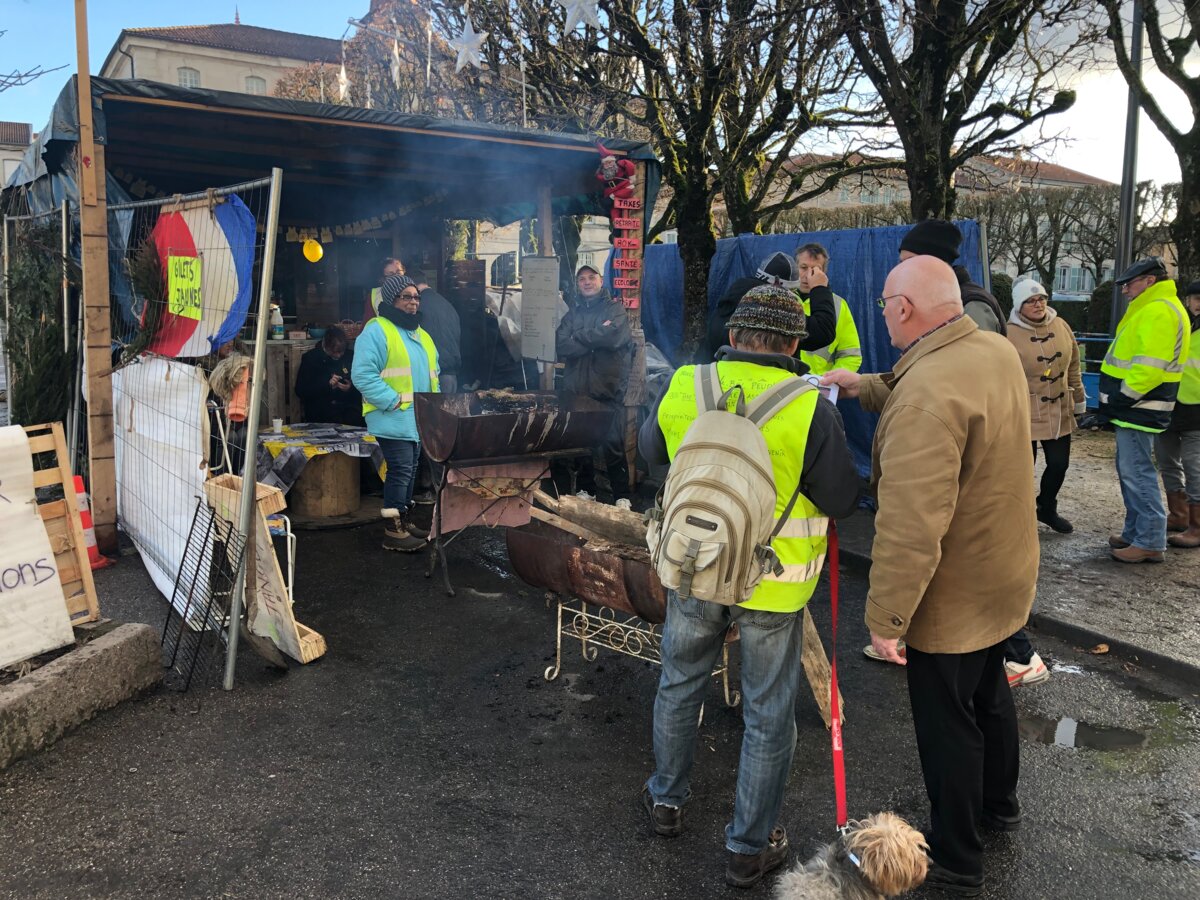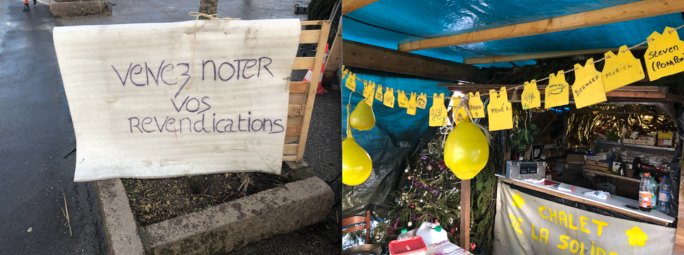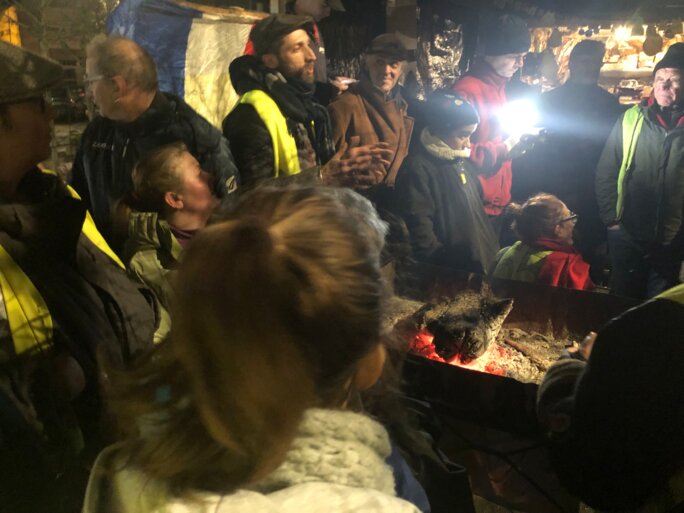It is 5.30pm on a Wednesday, darkness has just fallen and the general assembly can get underway. Around 50 members of the “yellow vest” (“gilet jaune” in French) social movement that has swept France in recent weeks are gathered around braziers in front of the hut, also known as the “cabin of solidarity”. It is a hut made of planks of wood built on November 20th in the days after the start of the movement on the main square in Commercy, a short distance from the town hall. A substantial agenda will be examined over two hours at the assembly, punctuated by regular votes.
A small industrial town of 7,500 people, which has experienced two decades of crisis and industrial collapse, Commercy has seen its inhabitants protest in some numbers, as they have in the rest of the Meuse département or county in this north-eastern corner of France since the movement began. “The three main roundabouts leading to the town were blocked and then hundreds of people have continued. And it won't stop!” says René, one of the two people running the “popular assembly”, accompanied by a moderator and a young man in charge of the minutes which will be posted the next day on the 'Gilets jaunes de Commercy' Facebook page.

Enlargement : Illustration 1


Enlargement : Illustration 2

But amid the national protests, the yellow vest in Commercy quickly stood out by organising a “popular assembly” with a slogan: “Power to the people, for the people, by the people”.
When the government attacks the yellow vest movement as one incapable of designating its own representatives, Commercy says it embraces precisely that form of direct democracy. “We don't want representatives who will basically end up speaking in our place! We're building a new system, where 'those who are nothing' as they scornfully say take back power over those who are gorging themselves. If we name representatives and spokespeople, it will end up making us passive. Let's take back power over our lives, long live the yellow vests in all their diversity!” they wrote in their first public appeal transmitted all over France.
On December 29th, the movement launched a second appeal. Congratulating itself on its “struggle which has been followed and supported so much and which has been so encouraging”, the group proposed organising in Commercy an “assembly of assemblies”. It went on: “Some have proclaimed themselves national representatives or are preparing lists for elections. Our voice is going to get lost in this maze or will be hijacked.... We are calling for a great meeting of local popular committees.” (See the whole appeal, in French, here.)
The message got through: response came from just about all of France (Saint-Nazaire in the west, Toulouse in the south-west, Montreuil near Paris and so on). Already, twenty-five groups have said they are prepared to take part and the assembly will take place at Commercy on Saturday January 26th.
- Here is the Commercy group's second appeal
The yellow vests of Commercy have been experimenting with this direct democracy for two months. “We are feeling our way, we are moving forward steadily, all that is quite logical,” says Jonathan, who has been present since the start of the movement. “At the start we had a normal form of organisation: one person spoke into the megaphone and the others listened. And then the sound system broke down, so we formed a circle so everyone could talk and listen. We're learning little by little and are improving our ways of making decisions, it's interesting.”
They have laid down several basic principles. First of all there is gender parity, equal speaking time is allotted for men and women and when they are in discussions with other groups in the region they have a team comprising of a man and a woman. “An example was with the writing of our second appeal. It took us an afternoon and there were a dozen or so of us, six men, six women,” says Jonathan. Then there is the systematic use of votes for all decisions, from the most important to smaller issues (such as, for example should they make yellow vest key rings). And if a vote does not produce a clear majority they look for new information and the decision is put to a subsequent vote.
“What we've discovered is the pleasure in speaking with each other, exchanging views, respecting one another,” says Mireille, who juggles a number of part-time jobs. “You can't agree on everything but the main thing is our fight.” Emmanuelle works in the town's main factory which makes parts for the aircraft industry. “I work shifts, painting aircraft pieces, not many women do that,” she says. “What I like here is the solidarity, you realise you're less isolated, that we have similar problems, and then there is also the friendliness, everyone's careful not to break up the group.”
'When I've paid all my bills I don't have much left over to last me the month'
Emmanuelle defines herself as “yellow vest 100% and just a yellow vest”. That last comment is a warning shot. “I don't want [our cause] to be claimed by others. Not being a party is the strength of this movement,” she says. For side by side within this collective of several dozen people which has come together during the weeks of their battle and their demonstrations, there are people of very different political hues: a former member of the anti-capitalist NPA party, a long-time supporter of the radical left La France Insoumise (FI) who was even a local candidate at the last parliamentary elections, right-wing voters, and environmentalists who have been involved in the protests over plans to store nuclear waste at Bure in the same département.
“Yes, there are doubtless among us some of the people who voted for the Front National [editor's note, the far-right party which is now called Rassemblement National],” says René, a retired teacher. “So what? We're not here to ask each person's political label. People no longer want to speak about that. What brings us together is a social and democratic struggle: against unfair taxes, taxes which hit the weakest, for greater spending power, for a complete change in the political system.”

Enlargement : Illustration 4

Many of them recall how the CGT trade union came to see them to offer their help. “They were annoyed to see this movement starting off so strongly and without them,” says Guy. “I know them well but we spoke about it with them and our answer was no. They can come, but by putting on a yellow vest and not with the union badge! Everyone here must leave their commitments or their affiliations at the door, otherwise it's guaranteed failure.”
How is it possible, after two months, for the group not to have fallen into irreconcilable disagreements between people close to the extreme left and extreme right? “What's happening is radically new,” says Claude, who is a civil servant who handles finances. “The people have risen without warning with real tax, social and political demands. We don't want to let ourselves be divided in the name of the old political forces, the parties. Everyone has something interesting to say, that's what we must take on board.”
René, the former teacher, explains how it works. On immigration, for example, it is better to avoid a discussion rather than come up against an obstacle. Emmanuelle, who happily acknowledges that there are diverse views, explains that she “doesn't want the environment to be talked about” and that some people involved in the protests against the plans for a nuclear waste dump at Bure had to be brought into line. “I am for the RIC – the citizens initiative referendum – and for social [issues]: that's all and that's broadly enough at this time,” she says.
Each person insists that they have left some of their personal convictions at home in the name of a greater cause, that of the yellow vests and a movement seen as both completely unprecedented and one that springs, at last, from the people. “I've had to wait 75 years to experience this, it's great,” says Alain. His working life, which involved travelling, journalism in the Middle East and photography, has left him with a pension of 980 euros a month. “And I've still got young children! So it's hard, sometimes very hard, but I'm not complaining,” he says.
As far as Alain is concerned the enjoyable part of the Commercy group is being able at last to talk differently about politics, without discussing parties, elections and representatives.
The drivers of some cars, their yellow vests placed on top of the dashboard - the now traditional sign of support - toot their horns. One man has just given 30 euros. Another brings a bag of food supplies. A pensioner stops at the 'hut' and has a discussion. “I have a pension of 850 euros [editor's note, a month], 420 euros in rent, local taxes. When I've paid everything I don't have much left over to last me the month,” he says. Two other people arrive: they want to write their demands in the book made available in the “cabin of solidarity”.
“They tell us that the movement is running out of steam and that all that's left at the hut are the isolated and those without a family, I can assure you that's not the case,” says Guy. “We gave a donation to the [television charity appeal] Téléthon, we spent an evening in Metz [editor's note, a city further to the north-east] handing out gloves, hats and scarves to the homeless, we regularly make soup to help others using vegetables given by market gardeners. And all that will go on.”
Guy was one of three to rewrite the original version of the Chante des Partisans – popular with the Resistance during the last war – to make it a Commercy yellow vest song (see video above) for an evening gathering. “We had a great night – we laughed so much!” he says. The new version begins:
Friend, can you hear the dark flight of finance over our wages?
Friend, can you hear the unprecedented popular suffering?
Hey, villagers, city dwellers and people in the suburbs, it's the alarm bells ringing!
The group is very proud of it too. Their song was picked up and sung as far away as Avignon in the south of France, at the yellow vest women protest at the start of January.
'Yellow tide' events across the region
Why has this experiment with popular assemblies happened in Commercy and not elsewhere? No one really has the answer to this even if different arguments are put forward. One is that there is a traditional working culture in a town that has gone through a deep crisis; another that there is a desire for solidarity in an area forgotten by the public authorities; a third is that a town that was for a long time controlled by the left and then swung to the right is waking up, as the old traditional parties disintegrate.
Doubtless those are all factors. As is the existence of a group who set up an association called Là Qu’on Vive a year and a half ago. “It's a place where anyone is free to come without feeling judged as to their social class, their origins, their gender: a space where one can once again meet, discuss together, learn to get to know each other and above all: to learn once more how to come together, through sharing knowledge and know-how, without there being a leader,” says the group.
The project has grown and the association has just bought a house in the centre of the town (see details here) to provide facilities to look after children, hold evening events, conferences, meetings of local collectives, and to be a place for authors and artists. “In fact in the back of our minds we dreamt one day of creating a popular assembly,” says Claude, a member of the association who has joined the “hut”. He continues: “And the yellow vest movement started, people were in the street, and it went even quicker. The aim was to make it about motorists' anger over the fuel tax, yet straight away it became an enormous social movement.”
Was it the Là Qu’on Vive association that came up with the idea for what some yellow vests call “libertarian municipalism”, a concept championed by American social theorist Murray Bookchin? “No, it's simpler than that,” says Jonathan, “some people came to see us, a Belgian student for example, and they spoke to us about that, of the different ways of self-organisation, from Chiapas [in Mexico] to Rojava even [editor's note, Kurdish region of Syria]. We're moving forward step by step. You have to take your time, listen to everyone and ensure that everyone gets a say.”
Back at the assembly general on January 9th, the agenda has been written on a little board.
Item 1: the election of two spokespeople – one man, one woman – for the “assembly of assemblies” which will be held on January 26th. It does not prove a simple process given the very strong fear about having a leader or representative. “I've been saying for a long time that we need representatives or at least spokespeople,” Emmanuelle had explained shortly beforehand. “We don't want a leader, that's quite right, but we must at least have some points of contact, some delegates, otherwise it's impossible.”
Only two people put themselves forward as candidates. But should they vote for candidates? Should they vote for people who express themselves well, who know how to communicate, asks Mireille, who doesn't like to speak in public? “So, for smooth talkers?” retorts a man. Should they draw lots, leave it up to a preference vote? As the video below shows, the debate continued.
The final vote came two days later. The general assemblies take place on Mondays, Wednesdays, Fridays and Sundays, while Saturday is demonstration day. For the yellow vests in Commercy take part in the “yellow tide” weekend events which are organised across the region. After events in Metz, Nancy and Épinal on January 5th, the yellow vests went to Bar-le-Duc on January 12th, the town where the département's prefect or state representative is based.
More than 2,000 had taken part in the protest at Épinal, an almost unheard-of number in such a town. Violence occurred at the end of the demonstration when the first tear-gas was used. Windows were broken and a police car was overturned. “Some violence disturbs me of course but not all, because there are some intolerable things,” says Emmanuelle.
Item 2 on the agenda: organising car-sharing for the Saturday journey to Bar-Le-Duc. “I'm going but I have to be back at 7pm to pick up my kids,” one participant informs the gathering. “So the period of time in custody will be very short,” says another in jest. The route is discussed, and fears are raised that members of the Black Bloc protest group or activists from the Bure protest might turn up. “It's at the end that it gets out of control, we'll leave early,” the assembly decides.
Item 3: the assembly of assemblies. A working group was set up and gives its report. More than 25 requests from regional groups have been made. The assembly asks for two spokespeople – one man, one woman – per group plus observers if they want. “Careful, the room we will have has 250 places maximum, that won't perhaps be enough at the rate the requests are coming in,” says one participant. The list of things that need organising include accommodation, food, communal cooking, the costs and so on.
Item 4: the case of Éric Drouet, one of the national figures of the movement whose arrest caused controversy. One participant, who calls himself “Reporter YouTube” as he films all the demonstrations in the region and the activities of the group in Commercy, explains that he has been contacted by Drouet. “He might be interested in coming, there you are, I'm passing it on...” The national yellow vest figure divides opinion. One part of those present are wary. Another section approves. Should they vote on it or not? The debate get animated. A compromise is found: they will not vote for or against Drouet but will instead vote to decide if the group should contact him or not. The vote goes in favour of contacting him.
The assembly comes to an end. Other actions have been discussed and some discussions continue. What if all this stopped in the weeks to come? “No, while there is this social situation it will continue and if it stops it will start again at some point or other,” says Emmanuelle. Alain prefers to recall a blockade at a toll booth that took place at the start of the movement. “There was a guy who had written on his vest 'Happy to see that we're free!' That's not bad, is it? Now all that remains to write is 'Happy to see that we're equal!'” Alain then says goodbye; he has to go back home to see his children.
----------------------------------------------------------------------------
- The French version of this article can be found here.
English version by Michael Streeter


